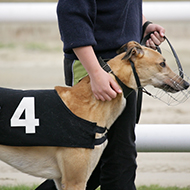
RSPCA, Blue Cross and Dogs Trust issue joint campaign.
Three of the UK's leading animal charities, the RSPCA, Dogs Trust and Blue Cross, have issued a joint call to end the practice of greyhound racing in the UK.
Internal reviews conducted by all three organisations found serious concerns at every stage of a racing greyhound's life, including danger and injury when racing and poor welfare standards in the dogs kennelling and transport.
The welfare organisations are explicitly calling for greyhound racing to come to an end, to prevent the unnecessary deaths of hundreds of dogs every year.
Highlighting data from the Greyhound Board of Great Britain (GBGB), the organisations have shared that over 2,000 greyhounds died from greyhound racing between 2018 and 2021.
The data also showed that almost 18,000 injuries were recorded between 2018 and 2021, with further injured on independent tracks.
Chief executive of the RSPCA, Chris Sherwood, said: “It’s shocking that more than one dog a day is dying due to racing which our review has determined is inherently unsafe and compromises their welfare at almost every stage of their lives; it simply isn’t acceptable.
“We’ve tried to work with the industry over the years to bring in better protection and improve welfare for the dogs but we’re not satisfied that enough progress has been made.
“We feel that now, moving forwards, the only way we can secure good lives for these dogs is to call for the sport to be phased out and we want to see greyhound racing consigned to the past.”
Other concerns raised by the three charities are the racing of greyhounds in extreme weather, potential lack of enrichment and poor diet, and puppies unaccounted for between birth and racing registrations.
Owen Sharp, Dogs Trust chief executive, added: “We are fully committed to the welfare of all greyhounds affected by our call for a phased end to the sport.
“We will continue to work collaboratively with the industry and other stakeholders to ensure the welfare of dogs is not compromised while working towards this.”
Dogs Trust, the RSPCA and Blue Cross are campaigning for greyhound racing to be ended as soon as possible, with a realistic phase out plan expected within five years, allowing the industry and animal welfare organisations to coordinate the care of affected dogs.
Chris Burghes, chief executive of Blue Cross, said: “The consequences for dogs involved in greyhound racing are so serious, and progress in improving welfare standards so slow, despite sustained and repeated attempts by the animal welfare sector to instigate change; we need an end to this ‘sport’.
“With injuries and death rife on and off the track, there can be no justification given for exploiting these animals and we appeal for government to take urgent action.
“We are committed to working with and advising the industry and government as to the fastest, most efficient way to bring greyhound racing to an end, whilst giving the highest priority to the dogs and their welfare during this time."
The Greyhound Board of Great Britain responded to the call, and Mark Bird, CEO of GBGB, said: "Welfare standards in licensed greyhound racing have improved dramatically over the past four years which is why this report fails to create an evidence-based case for reform.
"Since the launch of our Greyhound Commitment - which has led to a number of transformative welfare initiatives - progress has seen national track fatalities already reduced by half from 0.06 per cent in 2018 to 0.03 per cent in 2021.
"This is pandering to the whims of extremists - quoting data that is inaccurate, making claims that do not stand up to challege and trying to galvanise support at a time when the real emergency in animal welfare is elsewhere."



 The Veterinary Medicines Directorate (VMD) is inviting applications from veterinary students to attend a one-week extramural studies (EMS) placement in July 2026.
The Veterinary Medicines Directorate (VMD) is inviting applications from veterinary students to attend a one-week extramural studies (EMS) placement in July 2026.